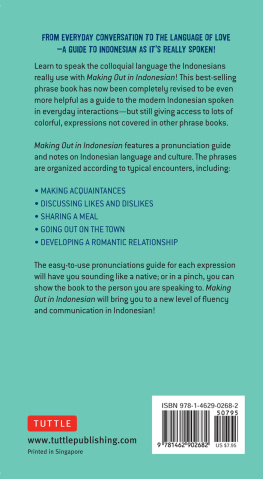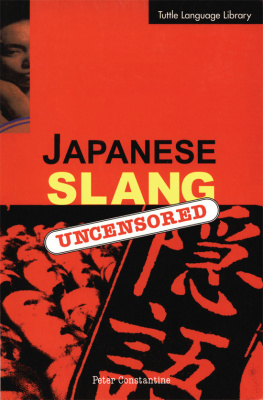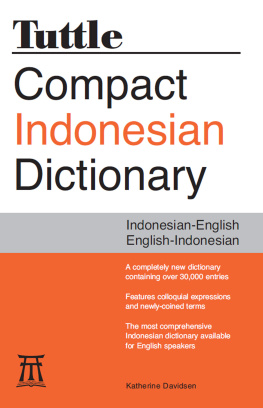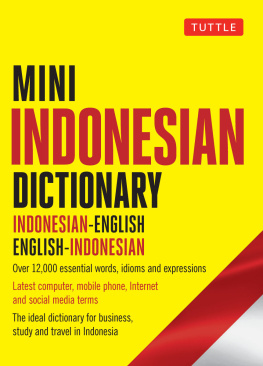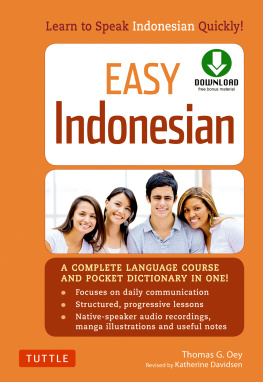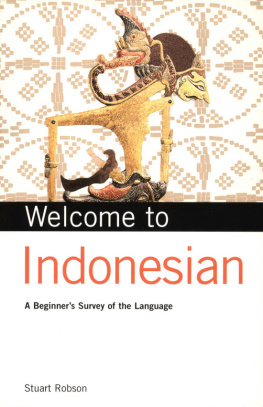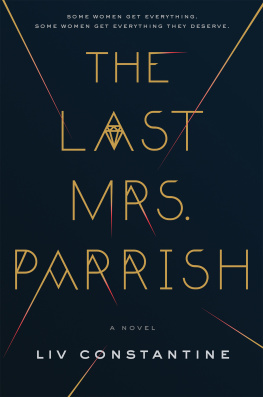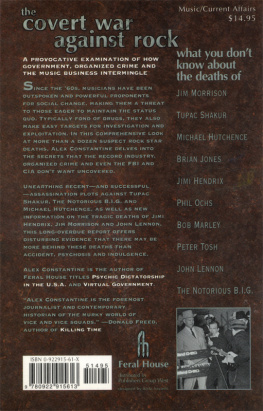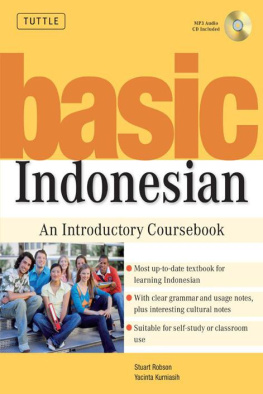Peter Constantine - Making Out in Indonesian
Here you can read online Peter Constantine - Making Out in Indonesian full text of the book (entire story) in english for free. Download pdf and epub, get meaning, cover and reviews about this ebook. year: 2003, genre: Detective and thriller. Description of the work, (preface) as well as reviews are available. Best literature library LitArk.com created for fans of good reading and offers a wide selection of genres:
Romance novel
Science fiction
Adventure
Detective
Science
History
Home and family
Prose
Art
Politics
Computer
Non-fiction
Religion
Business
Children
Humor
Choose a favorite category and find really read worthwhile books. Enjoy immersion in the world of imagination, feel the emotions of the characters or learn something new for yourself, make an fascinating discovery.
- Book:Making Out in Indonesian
- Author:
- Genre:
- Year:2003
- Rating:4 / 5
- Favourites:Add to favourites
- Your mark:
- 80
- 1
- 2
- 3
- 4
- 5
Making Out in Indonesian: summary, description and annotation
We offer to read an annotation, description, summary or preface (depends on what the author of the book "Making Out in Indonesian" wrote himself). If you haven't found the necessary information about the book — write in the comments, we will try to find it.
Making Out in Indonesian — read online for free the complete book (whole text) full work
Below is the text of the book, divided by pages. System saving the place of the last page read, allows you to conveniently read the book "Making Out in Indonesian" online for free, without having to search again every time where you left off. Put a bookmark, and you can go to the page where you finished reading at any time.
Font size:
Interval:
Bookmark:

The Tuttle Story: Books to Span the East and West
Most people are surprised to learn that the worlds largest publisher of books on Asia had its humble beginnings in the tiny American state of Vermont. The companys founder, Charles E. Tuttle, belonged to a New England family steeped in publishing. And his first love was naturally booksespecially old and rare editions.
Immediately after WW II, serving in Tokyo under General Douglas MacArthur, Tuttle was tasked with reviving the Japanese publishing industry. He later founded the Charles E. Tuttle Publishing Company, which thrives today as one of the worlds leading independent publishers.
Though a westerner, Tuttle was hugely instrumental in bringing a knowledge of Japan and Asia to a world hungry for information about the East. By the time of his death in 1993, Tuttle had published over 6,000 books on Asian culture, history and arta legacy honored by the Japanese emperor with the Order of the Sacred Treasure, the highest tribute Japan can bestow upon a non-Japanese.
With a backlist of over 1,500 titles, Tuttle Publishing is more active today than at any time in its pastinspired by Charles Tuttles core mission to publish fine books to span the East and West and provide a greater understanding of each.
Published by Tuttle Publishing, an imprint of Periplus Editions (HK) Ltd.
www.tuttlepublishing.com
Copyright 2003 Periplus Editions (HK) Ltd.
All rights reserved.
Distributed by
Indonesia
PT Java Books Indonesia
Kawasan Industri Pulogadung
JI. Rawa Gelam IV No. 9, Jakarta 13930, Indonesia
Tel: 62 (021) 4682 1088
Fax: 62 (021) 461 0206
Email: cs@javabooks.co.id
www.periplus.com
North America, Latin America & Europe
Tuttle Publishing
364 Innovation Drive
North Clarendon, VT 05759-9436, USA
Tel: 1 (802) 773 8930
Fax: 1 (802) 773 6993
Email: info@tuttlepublishing.com
www.tuttlepublishing.com
Japan
Tuttle Publishing
Yaekari Building 3F
5-4-12 Osaki, Shinagawa-ku
Tokyo 141-0032, Japan
Tel: (81) 3 5437 0171
Fax: (81) 3 5437 0755
Email: tuttle-sales@gol.com
www.tuttle.co.jp
Asia-Pacific
Berkeley Books Pte Ltd
61 Tai Seng Avenue #02-12
Singapore 534167
Tel: (65) 6280 1330
Fax: (65) 6280 6290
Email: inquiries@periplus.com.sg
www.periplus.com
LCC Card No. 2009504245
ISBN: 978-1-4629-0268-2 (ebook)
17 16 15 14 13 9 8 7 6 5 1302CP
Printed in Singapore
TUTTLE PUBLISHING is a registered trademark of Tuttle Publishing, a division of Periplus Editions (HK) Ltd.
Contents
_________________________________
Introduction
_________________________________
Making Out in Indonesian is your passport to the living, breathing, colorful language spoken on Indonesias streets. It is the first book that will give you access to the casual, unbuttoned Indonesian that will allow you to express yourself in restaurants, bars, and nightclubs, in crowded marketplaces, and at train stations. Here you will find the warm-hearted language that you can use with friends, and also the rough-and-tumble language you can fall back on when you are ready for a fight.
This brand of Indonesian is both simple and direct. It is spoken mainly in Jakarta but is understood anywhere in Indonesia. It has shed the complex grammatical twists and turns of the highly formal language that textbooks and language courses strive so hard to teach. In fact, travelers who roam the streets of Jakarta with grammars and heavy dictionaries often find that they will not get anywhere at all.
Why does no-one here understand what Im saying? they wonder. And, whats more to the point, why cant I understand anybody else? The answer is simple. They have not breezed through Making Out in Indonesian the phrase book that will teach everything anyone needs to know about plain-spoken everyday language.
Making Out in Indonesian will be a useful companion throughout Indonesia, even when traveling in the furthest outbacks. And beyond Indonesia, you will quickly find you can make yourself understood wherever Malay is spoken in Asia: in Singapore, Malaysia and Brunei!
So you want to meet people, make friends, eat out, go dancing, or just take part in friendly chitchat? A quick glance at Making Out in Indonesian and youll have the language at your fingertips.
Information
If you have spent years grappling with the complicated grammatical structures of French, German, Italian or Spanish, you will find Indonesian, especially the informal version in this book, a joy. There are no complicated tenses to learn, no irregular verbs, no nouns with masculine, feminine, and neuter, single or plural forms, no conjunctions and declensions.
The easy-going language spoken today on Indonesias streets evolved from the simple Malay pidgin that developed over the centuries as traders from hundred of ethnic groups mixed and mingled, from southern Thailand and Singapore all the way down the Indonesian archipelago to Irian Jaya. In the early Middle Ages, the Arabs and Persians flooded the language with their own vocabularies, as did the Moluccans, the Sundanese, the Javanese and later the Portuguese, the Dutch, and the British. By the nineteenth century, Bazaar Malay Melayu Pasar was in full swing, a Malay filled with exotic phrases that could be strung together freely without the complex derivation and inflection affixes of the formal language that was spoken at the court of the Malacca Sultanate.
Todays Indonesian slang has kept much of the simple directness of the old street lingo:
Lu udah makan? (You already eat?)
Have you eaten?
Belum makan. (Not yet eat.)
I havent eaten yet.
Mau makan? (Want eat?)
Do you want to eat?
Ya, mari pegi! (Yes, cmon go.)
Yes, lets go!
Kami pegi ke restoran? (We go to restaurant?)
Shall we go to a restaurant?
Nggak, pegi kemarin! (No, go yesterday!)
No, we went yesterday!
Verbs
In casual colloquial Indonesian, verbs do not change their form. Mau (want), ada (have), pergi/pegi/cabut (go), makan (eat), or minum (drink), for instance, will remain invariable.
gua mau | (I want) |
lu mau | (you want) |
dia mau | (he/she wants) |
kami mau | (we want) |
kalian mau | (you want) |
mereka mau | (they want) |
Past, present, and future tenses are not differentiated: Gua pegi (I go) can also mean I am going, I went, I was going, I would go, I would have gone, I will go, or I will be going.
If you wish to be more specific as to when something happened, you can add words that clarify the time frame in place of verb tense. Some of these more common words are:
kemarin | yesterday |
udah/dah | already |
tadi | earlier |
sekarang | now |
akan | will |
nanti | later |
besok | tomorrow |
Personal Pronouns
I
In formal Indonesian, the words for I are saya and the more casual aku. In Jakarta slang, however, the Hokkien Chinese words gua and gue are used interchangeably. In this book, gua is used for the most part, except in the sections MAKING FRIENDS and LOVERS LANGUAGE, as Indonesians from all walks of life prefer to use more formal and elegant language in romantic situations and with people they meet for the first time. If you are not sure which I to use and want to be more rather than less polite, use saya.
Next pageFont size:
Interval:
Bookmark:
Similar books «Making Out in Indonesian»
Look at similar books to Making Out in Indonesian. We have selected literature similar in name and meaning in the hope of providing readers with more options to find new, interesting, not yet read works.
Discussion, reviews of the book Making Out in Indonesian and just readers' own opinions. Leave your comments, write what you think about the work, its meaning or the main characters. Specify what exactly you liked and what you didn't like, and why you think so.

